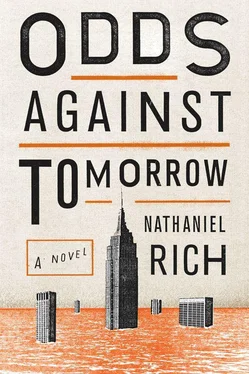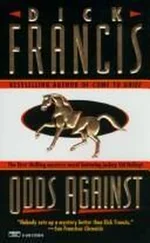At the far end, there was a brown door. Mitchell’s thinking began again to slow down and this time he decided to feel the door before opening it. It was not any hotter than the air, so he opened the door and looked into a second room.
This was not a bedroom, not exactly, more like an alcove, though there was a single bed in it. The bedsheets had been pulled back, revealing the mattress. There was an IV stand beside it, and on a table near the doorway there were about a dozen empty orange prescription bottles. Mitchell looked at one of the labels. It said, in a sloppy cursive: “Isoproterenol — dissolve 10mg in 1 gallon purified water/BRUNER, ELSA.”
He scanned Elsa’s room for an envelope with his name on it, but he saw nothing. There was another doorway leading out of the not-exactly-bedroom, but flames were licking around the jambs. When he angled over to look into the hallway, all he saw was a curtain of bright blue fire. He realized that he was coughing again, only worse than before, and the pine needles in his lungs had become small scalpels that were excavating his chest from the inside. He backed away, out of Elsa’s room and into the office, where two small arms grabbed him around the waist.
She dragged him outside, and he didn’t resist. They stumbled into the softball field, coughing, and collapsed into the dry dust.
“Your face,” said Jane, coughing. “Oh dear God.”
She gave him a bottle of water and he drank, pausing every few gulps to cough and spit and breathe. Jane bent over his face and gently wiped away the inky soot.
“I don’t understand you,” she was saying. He didn’t tell her how much it hurt when she touched his face. Her fingers trembled as they brushed his skin.
“Is it bad?” he asked, when he could speak.
“It’s not good,” she said, pouring water on his scraped chin. “But it could’ve been worse. You could be dead.”
“She wasn’t there.”
Jane pulled back, squinting down at him quizzically. She nodded. “Now I know what it is that’s getting me.”
“What?”
“You don’t have eyebrows anymore.”
* * *
At the gate they found the woman with the squid-ink spaghetti hair.
“See? They’re fighting for control. It’s a zoo. A war . I just know my husband won’t come back. He’s off in the woods. Thinks he’s back in his regiment.” She looked at Mitchell more closely. “You should put some Neosporin on that. What did you do, run into the fire?”
“The people who ran the farm,” said Mitchell. “What happened to them?”
“The kids? They’re gone .”
“Gone? Gone how?”
“I don’t know. No one does.”
“You haven’t heard anything.”
“Oh, I have heard things. I have heard Canada. I have heard the Midwest. And I have heard that they never made it out of the infirmary.”
“You tried,” said Jane, handing Mitchell the folded page from the Kennebec Journal . “But now it’s time to call Judy.”
They sleepwalked through the billowing smoke, past a young girl defecating in the middle of the road and a woman curled on the shoulder bawling for her husband and a boy of twelve or so crawling through the brush, his arm bandaged and bloody — they walked away from Ticonderoga and Elsa Bruner’s exploded dream.
Judy’s station wagon was waiting just past the fork in the road. She had never left.
5.
“As in the prophet Mitchell Zukor?”
“Excuse me? No. Um. I don’t think so.”
“The financial consultant Mitchell Zukor, the guy who predicted…” The FEMA representative, struggling to put it into words, overwhelmed by the magnitude of it all, finally just gestured around her to the white trailers and the snaking food lines and, in the distance, the smoke billowing from the Manhattan skyline. The skyline looked like photographs of Beijing, the smoke blurring the contours of the buildings into a swampy gray soup.
“Yes,” said Jane. “ This guy. Mitchell Zukor. Z-u-k-o-r. He is also the founder and director of Future Days, a new futurist consulting firm.”
“ My . What are you doing here? Of all people—”
“We’d like a trailer,” said Jane. “Our own trailer. If possible.”
“I’ll see what I can do.” But then the FEMA employee turned back to Mitchell and a tremor passed through her body. Her bureaucratic seemliness cracked and split open. “Mr. Zukor, if you don’t mind. What is going to happen to us next?” She was becoming mucousy. “God help us, what will happen next?”
* * *
It had been a lively drive back from Vacationland — a shorter one too. The trip to Augusta had taken three days; they made the return in six hours. But first Judy had stopped at her house on Winthrop Street, where she found a bandage for Mitchell’s chin, a tube of first-aid cream, and a jar of aloe vera.
“You look like a Martian,” said Judy as Jane gingerly applied a dressing of the green goo to Mitchell’s pink face. “Does it hurt?”
Mitchell shrugged, as if to suggest that he couldn’t feel the burn. But he felt it, oh Lord did he feel it, the skin tender and already beginning to blister. When Jane accidentally applied pressure to his cheek the pain caused his eyes to water.
Jane ordered Mitchell into the backseat and explained to him that she would be making the decisions from now on. She asked Judy to take them to the nearest police station so they could report what they’d seen at Ticonderoga.
“The cops?” said Judy in mock disbelief. “The cops are overwhelmed. They’ve never seen anything like this before. Most of these folks work on call, part-time, and they never had to govern a crowd or do much more than write folks speeding tickets. They’re stuck in the cities. At the state refugee centers in Augusta, even in Lewiston, there are breadlines for miles. A man in South Portland was stabbed to death because he cut the line. And Canada is squeezing the border.”
“Fine, but something has to be done.”
“It’ll improve once all the power comes back. People will resettle elsewhere. But for now there is nothing to do. Only panic.”
Jane, having taken control of Mitchell’s Go Bag and the cash inside of it, offered Judy an extra hundred dollars to drive them to the Portland bus terminal. There Jane found a Greyhound driver named Herman Loaiza who had been contracted by FEMA. He was about to return to New York, on two hours of sleep, to collect a new batch of refugees.
“You want to go back there ?” said Herman, looking suspiciously at Mitchell, whose face still glistened with the green aloe. “What, you forgot something?”
“We have nothing keeping us here,” said Jane.
“New York is admitting nobody. Not even buses.”
“Then where are you going?”
“Randall’s Island. FEMA Trailer City. That’s where the folks are waiting to evacuate. Nope, sorry.”
Jane opened Mitchell’s Go Bag and showed Herman the cash-stuffed ziplock.
The northbound lanes were still jammed but the southbound road was empty. Herman kept it at eighty miles an hour. Mitchell lay across a pair of seats and tried to figure out why he had wanted to run inside the burning infirmary. Perhaps he had just wanted to see it for himself, the incineration of Elsa’s Ticonderoga dream. There was a grim satisfaction in that, as there was in the sight of the men stalking the woods. Elsa’s fantasy had been overrun by the actual world and its desperate hordes, and the tragedy — which was really almost a comedy — was how plainly predictable this outcome should have been. Even without the flood, a design so excruciatingly naive couldn’t have survived very long. What confused Mitchell was how he had failed to see it coming himself. If anyone should have been able to predict the chaos that Ticonderoga had become, it was Mitchell. This was his profession, after all. He didn’t have to do historical research on utopian communes or cooperative societies in order to know that most of them ended in disillusionment, pettiness, and, yes, violence. If he could insure behemoth corporations, shield them from risk, why hadn’t he tried harder to save the life of a single sick girl?
Читать дальше












